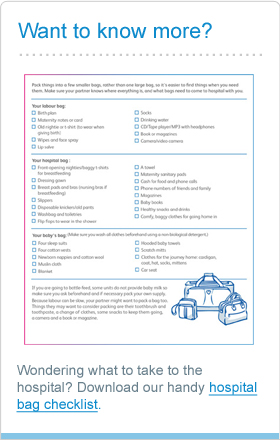| If you can't view this SMA Baby Club email click here |
 |
 |
 |
 |
|
| |
|
Dear [*data('91.salutation')|html*]
Find out more about pregnancy. |
|
|
|
Make time for yourself
In a few weeks you’ll finally be holding your baby in your arms. So make the most of this precious time to rest, relax and prepare for your baby’s birth.
Soon after your baby is born your midwife will help you with your first breastfeed. Babies are usually alert and eager to feed in the first hour after birth. The nutritious golden milk you’ll make in the first few days is called colostrum. It’s very concentrated so your baby doesn’t need much and will take small amounts often.
Believe it or not, your breasts have been ready to breastfeed your baby from around six months of pregnancy.
Colostrum, the yellowish milk you’ll produce to begin with, contains all the nutrients your newborn needs, plus antibodies to protect your baby from infections. It also contains a gentle laxative to help your baby pass meconium, the sticky black poos that all newborns do.
Don’t worry if your breasts leak a bit over the next few weeks – this is perfectly normal. You may want to ensure your bra is well fitted and that you have a box of breast pads, just in case. |
|
|
 |
|
What to expect
In the early weeks, you’ll need to feed your baby ‘on demand’– that means whenever and for as long as your baby wants. You’ll find that sometimes your baby just wants a 10-minute ‘snack’ while at other times they may be on your breast for nearly an hour.
Sometimes feeds are close together and sometimes far apart. All this is quite normal. Eating healthily and getting plenty of rest will help you to boost your milk supply and keep your energy up. |
|
|
|
 |
|
| We answer hundreds of questions a week from parents. For free support and advice, get in touch via our new Live Chat service, call or email.
|
|
|
 |
|
|
Come and get to know us a little better. |
|
|
|
| Important Notice: Breast milk is best for babies and breastfeeding should continue for as long as possible. Good maternal nutrition is important for the preparation and maintenance of breastfeeding. Introducing partial bottle-feeding may have a negative effect on breastfeeding and reversing a decision not to breastfeed is difficult. You should always seek the advice of a doctor, midwife, health visitor, public health nurse, dietitian or pharmacist on the need for and proper method of use of infant milks and on all matters of infant feeding. Social and financial implications should be considered when selecting a method of infant feeding. Infant milk should always be prepared and used as directed. Inappropriate foods or feeding methods, or improper use of infant formula, may present a health hazard. |
|
All the best,
The SMA Baby Club |
|
|
|
 |
 |
 |
 |
 |
 |
|
Please do not reply to this email, as the mailbox is unmanned. For any help or assistance please contact our Careline team.
ZTC1094ae/08/15
Nestlé UK Ltd & Nestlé (Ireland) Ltd ®Reg. Trademark |
|
 |
|